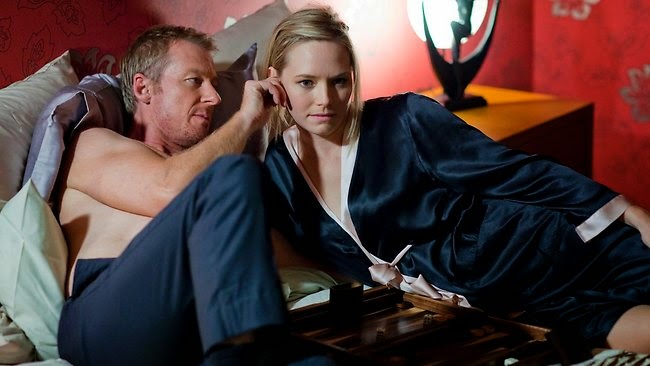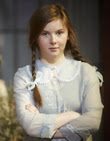As good as some of our cable television series are, it takes watching a season of the best of interna-tional TV -- Borgen from Denmark, Spiral from France, and now RAKE from Australia -- to fully understand and appreciate of what the medium is actually capable. If this title sounds familiar, it's because Rake was recently re-done for American TV, starring that excellent actor Greg Kinnear. I haven't watched the American version yet because I can't stand sitting through commercials (and even hate having to fast-forward via DVR). So I shall wait until it, too, streams commercial-free via an affordable service such as Netflix -- where you can now see the original version -- before I attempt critical comparison.
As good as Mr. Kinnear has been in just about every role in which I've seen him, it's hard to believe he could outdo one of Australia's best actors, Richard Roxburgh (above, with Adrienne Pickering, and on poster, top), in this intriguing and memorable role. I've been a fan of Roxburgh's since the delightful and underseen Children of the Revolution from 1996, but this is clearly the role he's been waiting for and he knocks it, in episode after episode, to kingdom come.
The series is written exceedingly well. Almost every episode deals with a different kind of criminal case -- from cannibalism to bigamy to terrorism and laws such as the Aussie version of our sleazy Patriot Act -- and the plots are chockablock with ideas that will quickly knock you on your ass and then make you work your way back to a standing position. (That's Robyn Malcolm, above, who plays the randy woman to whom Cleaver owes both a lot of money and a lot of screwing.)
The series is also hugely funny, often laugh-out-loud so. And it is full of oddball characters whom you'll grow to love as much as you did those on The Mary Tyler Moore Show -- even if these people are a lot more into letting it all hang out. They are all dealing with the problems that face us in these current times -- monetary to political -- as well as those that have dogged us since man and womankind first appeared: infidelity, parenting, owning up to it all. (Above, left, is the commendable Russell Dykstra, who plays Cleaver's semi-partner and best friend, Barney.)
As a terrific bonus, almost all the episodes offer a "guest star" who is one of Australian and/orNew Zealand movie royalty: Hugo Weaving, Jack Thompson, Martin Henderson, Noah Taylor, Toni Collette (shown at left), Rachel Griffiths, and on and on. Sam Neill, bless his heart, gets an episode that, along with his amazing work in the must-view Dean Spanley, should see him become the go-to actor for anything dog-related.
Each episode, running around 55 minutes, is generally self-contained, but the characters spill over into the entire two seasons that are so far avail-able via Netflix. I hope there will be more. And if the first season is super-ior to the second, there are certain episodes in the latter than are as good as anything you'll find on TV. In fact, Season 2, Episode 2, R v. Fenton (shown below), which tackles, among other things, "Newspeak," is beyond brilliant. (That's Keegan Joyce, above, who plays Cleaver's son, Fuzz.)
I cannot recommend this series highly enough. And you can see it now via Netflix streaming (it's not available on Amazon). Why wait?
























